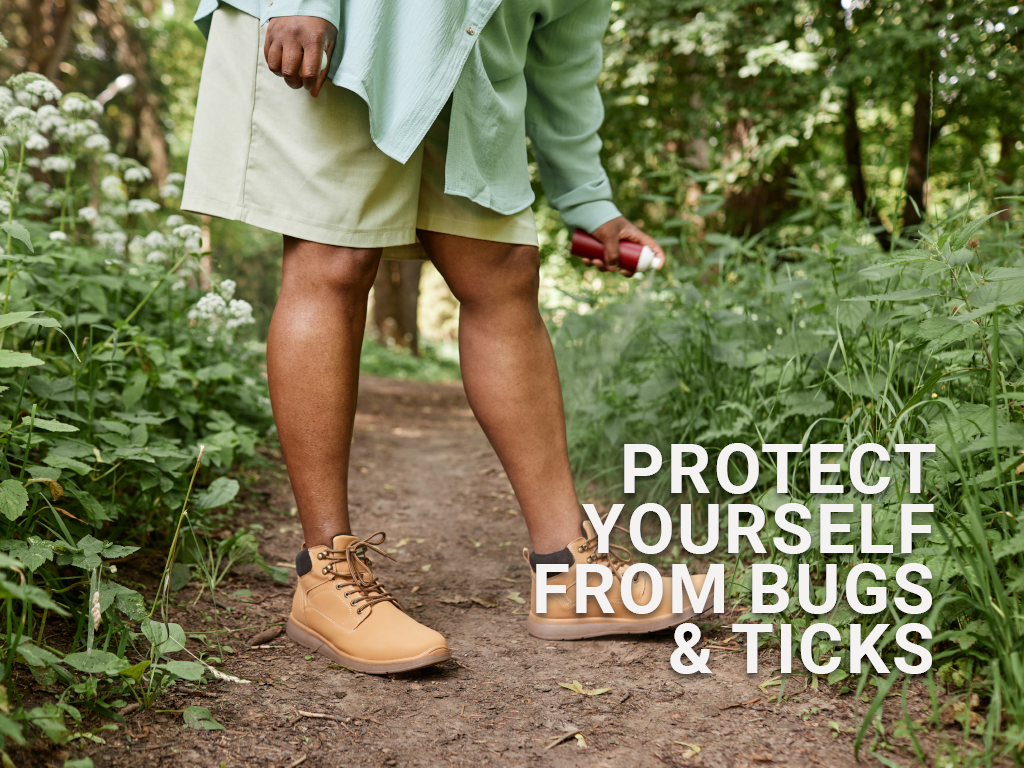Bug repellent is the last thing you need to run out of during summer in Canada. Blackflies, ticks, mosquitoes—the list of pests swarming in sweltering heat goes on. We aren’t talking about a few bug bites or the occasional discomfort. Many of these pests, such as deer ticks1, carry deadly diseases like Lyme disease and West Nile Virus. Similarly, mosquitos carrying viral infections2 are spreading at unheard-of rates.
Whether you love hiking, picnicking with the family, or enjoying warm evenings in your backyard, insect bites ruin the experience. With the right clothing, spray, and prevention strategies, you can enjoy a bite-free summer.
How to Choose the Best Bug Spray
Choosing the right bug spray matters regarding your family’s protection. But which one is the best option? Here are some facts you should consider:
- DEET is an effective bug spray ingredient that repels ticks, blackflies, and other pests. However, most people prefer different options for children between 6 months and 12 years of age. Avoid bug spray for kids that have this ingredient.
- Picaridin is non-greasy, odourless, and repels a wide range of insects. Parents prefer this option over DEET sprays because it’s gentler.
- Oil of Lemon Eucalyptus (OLE) is approved by Health Canada and is plant-based. It’s quite effective for families searching for gentle and natural alternatives to bug repellents with chemical ingredients. However, it isn’t recommended for children younger than three years old.
- Always read the label for age-based instructions. Do a patch test first on your skin before applying the product on children avoiding the hands, eyes and mouth.
- Aerosol sprays are fast to apply but can be messy. Pump sprays are easier to apply with precision, while wipes and lotions are safer for small children.
How to Use Bug Repellents Effectively
Even the best bug spray won’t work effectively if it’s not applied well. For example, never apply it under clothes, always on exposed skin and clothing. Avoid the eyes, nose, mouth, and hands, especially for kids, since they touch their faces often.
You can also use both sunscreen and bug spray. Apply sunscreen first and then the spray. Don’t reapply the bug repellent unless the label says otherwise. Wash it off with soap and water before bed when you come inside.
Preventing Insect Bites Without Spray
Bug spray is helpful, but you can block insects without it as well with these tips:
- Wear long sleeves, pants, and closed shoes. Light-coloured clothing is best, and dark colours attract more bugs. For babies in strollers or carriers, use bug netting for protection.
- Avoid standing water3, such as puddles, birdbaths, and clogged gutters, which are prime mosquito breeding spots. Ticks love tall grass and wooded areas, so stick to clear trails when hiking.
- Mosquitoes are most active at dawn and dusk, so consider staying indoors during those times or standing on screened-in patios and porches.
- Try citronella candles, bug-repelling coils, or even portable fans. These prevent mosquitoes from landing on exposed skin.
Tips for Treating Bug Bites
Even the best bug repellents can fail. Here are some quick tips to relieve itching and reduce swelling:
- For blackfly and mosquito bites, wash the area with soap and water before applying an anti-itch cream. Oral antihistamines are best for stronger reactions or to relieve nighttime itching.
- Don’t scratch so hard that you break the skin. It can cause an infection.
- Monitor tick bites closely. Carefully remove any attached tick with tweezers and clean the area. In the next few days, check for flu-like or fever symptoms. A higher-than-normal temperature can indicate Lyme disease.
- Pus, swelling, fever, or redness may be an allergic reaction to a bug bite. If you are unsure, contact your healthcare provider.
Ask a Sunshine Drugs pharmacist for the best bug repellent.
Not all bug sprays are alike, and our knowledgeable staff can suggest the right one for you and your family. Whether you are camping in the woods, need to keep insects away from your baby, or soothe insect bites, we can recommend the best products.
Ready to enjoy a bite-free summer? Share your favorite bug repellent tips in the comments below!
References
[1] Public Health Agency of Canada. (2015, January 27). Prevention of Lyme disease. Government of Canada. Retrieved from https://www.canada.ca/en/public-health/services/diseases/lyme-disease/prevention-lyme-disease.html
[2] CBC News. (2023, August 15). Why insect-transmitted illnesses are emerging threats in Canada and beyond. Retrieved from https://www.cbc.ca/news/health/why-insect-transmitted-illnesses-are-emerging-threats-in-canada-and-beyond-1.6959492
[3] Breakthrough Action and Research. (n.d.). Remove standing water: Key facts. Retrieved from https://breakthroughactionandresearch.org/wp-content/uploads/2019/04/standing-water.pdf

